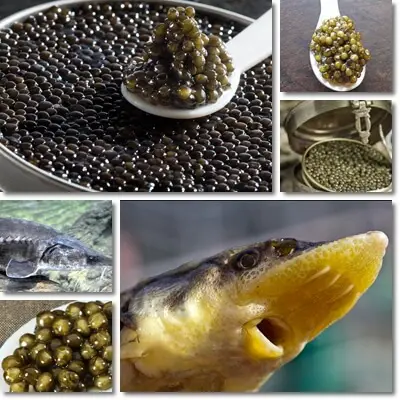Sturgeon eggs are the eggs of female sturgeon fish. They are also called sturgeon roe and are a source of excellent nutrition and varied health benefits. There are almost 30 different species of sturgeon, three of which possess huge economic value: Beluga, Osssetra and Sevruga. The eggs of these three species are the source of the most famous and expensive caviar varieties, caviar being a delicacy in terms of seafood. Sturgeon eggs used for caviar making are only lightly processed, usually just salted, and offer a wonderful taste experience.
What is the difference between sturgeon eggs or roe and caviar?
Sturgeon eggs or roe are what caviar is made of. Actually, they are the only thing genuine caviar is made of. And there isn’t much of a difference between the two either. Sturgeon eggs refer to the eggs of female sturgeon fish, and sometimes also the ovary membranes encasing the eggs. Caviar is essentially the salted eggs of female sturgeon fish. The eggs are freed from the ovary membrane, then salted and packaged. It may be aged as well. Caviar is rated according to the fish species the eggs are sourced from, age of the fish, quality of individual eggs judged in terms of color, taste and other factors.

Technically, authentic caviar is made exclusively from sturgeon roe and the greatest economic value comes from three species: Beluga, Ossetra and Sevruga. But because most species of the fish are currently endangered, the fish roe cannot be sourced from the wild, but rather from fish farms. Even so, not all caviar is from sturgeon. There are l0w-cost caviar options made from other fish roe, including salmon, trout, lumpfish, hackleback fish, cod, whitefish or carp. However, caviar is only from sturgeon, so these more affordable options are not considered actual caviar, but rather imitations.
Average nutrition facts of sturgeon roe for 1 tablespoon (16 g)
On average, a tablespoon of the fish eggs at 16 g provides 3-4 g of protein, 2.5-3 g of fat, no carbohydrates, no sugar and no fiber and about 40-45 kilocalories. The same amount of sturgeon roe (eggs) gets you 145-200 IU vitamin A, roughly around 5% of the recommended daily intake, RDI for an average adult. You also get about 10% of the RDI for vitamin D, but very little overall vitamin E. Vitamin B12 content of sturgeon roe ranges from over 50% RDI to almost 140% for one tablespoon. Most other B vitamins are around 5% or less. The fish eggs have no vitamin C (especially true for salted and aged caviar) and usually no quantifiable amounts of vitamin K.
One aspect of sturgeon roe nutrition that is not beneficial for health is the relatively high sodium content. While fish eggs are not naturally high in sodium, they are salt-cured to increase their shelf life. Sodium content for sturgeon roe varies from as little as 10 mg to as much as 240 mg or more for as little as one tablespoon. With 1.9 mg of iron per tablespoon, or about 10% of RDI, the fish eggs are good for general health, promoting vitality and elevated energy levels. The same amount provides around 48 mg of magnesium, a little over 10% RDI, and 10.5 mcg of selenium, or about 15% of RDI. Small amounts of copper, calcium, phosphorus, potassium and zinc, around 5% or less of RDI, serve various health benefits.

Sturgeon eggs health benefits
1) Omega-3 for the brain and heart. Thanks to generous amounts of EPA and DHA Omega-3 fatty acids (around 1000 mg) which make up cell membranes in the brain and rest of the body as well as hold anti-inflammatory benefits. Studies show Omega-3, especially the forms from fish and fish eggs, benefit mental health as well and may be good for depression and anxiety.
2) Cholesterol for fertility and hormonal balance. With around 90 mg of cholesterol per tablespoon, the fish eggs help the body process vitamin D which helps female fertility. Additionally, cholesterol helps make hormones for endocrine health.
3) Vitamin D for immunity and fertility. There is around 10% of the recommended daily intake of vitamin D in a tablespoon of sturgeon roe. Vitamin D supports the immune function and boosts female fertility, among other benefits.
4) Selenium for thyroid health. There are about 10.5 micrograms of selenium in a tablespoon of sturgeon eggs, accounting for around 15% of the recommended daily intake. Selenium is vital for iodine metabolism and is needed to produce thyroid hormones. Eating sturgeon or other fish eggs is good for thyroid health.
5) Protein for muscles, brain and the immune system. Sturgeon eggs are rather high-protein, providing 3-4 g per tablespoon. Protein helps with muscle gain and repairs damaged muscle fibers. It further works as an immune system cell and fights infection and disease. The amino acids that make up protein are used to make neurotransmitters for the brain to regulate mood, appetite, sleep and more.
6) Vitamin B12 and iron for vitality and red blood cell production. Sturgeon and other fish eggs are an anti-anemia food thanks to their excellent vitamin B 12 and iron content. Vitamin B 12 and iron are used for red blood cell production and muscle oxigenation. The two nutrients combat muscle weakness and fatigue and restore vitality.
Sturgeon roe and pregnancy. While vitamin B12 and iron are especially good during pregnancy, pregnant women might not actually benefit from eating sturgeon eggs, notably the raw product. Ideally, fish eggs should be pasteurized to avoid worms and intestinal parasites as well as reduce the risk of bacterial infections.
7) Other B vitamins for nervous system health. Vitamins B1, B2, B3, B5, B6, B9 and choline not only support nervous system health, but they also contribute to energy metabolism, raising energy levels for improved productivity.
8) Modest source of calcium, magnesium, phosphorus for bone health. In addition to vitamin D, the fish eggs provide calcium, magnesium and phosphorus, three minerals that make up bones and teeth. Having enough of each of them ensures strong, healthy bones and teeth.
Sturgeon eggs side effects
1) Source of saturated fat.
2) High in cholesterol.
3) High in sodium.
4) Risk of bacterial and parasitic infections from the raw, unpasteurized eggs.
5) Allergic reactions.
Like with all foods, sturgeon eggs can be a source of side effects, not just benefits. For the most part, the raw, unpasteurized fish eggs are contraindicated for babies and small children, pregnant women and anyone with poor immune system function or immunodeficiency due to a risk of bacterial or parasitic infections. Another side effect of sturgeon eggs is they are typically salt-cured and can provide up to 240 mg of sodium per tablespoon. If you suffer from hypertension, then it’s important to limit intake to no more than one tablespoon to avoid high blood pressure and maybe not have fish roe every day. Because they are a source of saturated fat and cholesterol, the eggs are best eaten in small amounts since fat encourages weight gain which, in turn, affects cardiovascular health raising blood cholesterol levels.
Sturgeon roe can trigger allergic reactions with the potential for anaphylactic shock in those allergic to fish and fish products. Anaphylactic shock is a medical emergency and requires immediate medical attention. If you know or suspect an allergy to a food, whether fish in general or a certain variety, avoid the (suspected) allergen in all forms and preparations. And know that if you are allergic to a fish, you are also allergic to its eggs.
